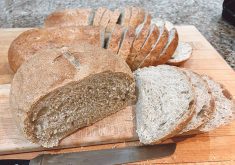Nineteen farmers are running for five Canadian Wheat Board (CWB) directors’ positions this fall in an election many believe will be the most important since CWB governance was changed in 1998.
The mandate and perhaps the very existence of the CWB hangs in the balance as farmers vote in Districts 2, 4, 6, 8 and 10.
But there’s confusion over who is and who should be on the voters’ list, there’s controversy over the form used to get on the list and a court case pending that could result in the election results being thrown out and another election called.
Read Also

Mazergroup’s Bob Mazer dies
Mazergroup’s Bob Mazer, who helped grow his family’s company into a string of farm equipment dealerships and the main dealer for New Holland machinery in Saskatchewan and Manitoba, died July 6 from cancer.
Farmers are being advised to check with the Canadian Wheat Board election co-ordinator before Nov. 14 to determine whether they are on the list of eligible voters.
Eligibility
All farmers are eligible to vote if they have land in an even-numbered CWB district and during the 2007-08 or 2008-09 crop year produced one or more of the following crops: wheat, oats, barley, rye, flax, rapeseed or canola. (Landlords, vendors or mortgagees entitled to a share of those crops are also eligible to vote.)
But some eligible farmers will have to apply for a ballot if they want to vote. Only farmers with CWB permit books who delivered grain to the CWB during this and the last crop year will automatically receive a ballot in the mail following a controversial move by Agriculture Minister Gerry Ritz earlier this year.
Last week the Federal Court rejected the Friends of the Canadian Wheat Board’s (FCWB) request for an expedited hearing into whether Agriculture Minister Gerry Ritz illegally removed thousands of farmers from the voters’ list.
Federal Court Judge James W. O’Reilly granted FCWB a judicial review into allegations Agriculture Minister Gerry Ritz illegally instructed the wheat board to remove farmers from the CWB election voters’ list.
However, O’Reilly turned down the group’s request for an expedited hearing into the charges and rejected a request to put the altered list on hold pending the outcome of the judicial review.
Surprise exclusion
Stewart Wells, president of the National Farmers Union and member of the FCWB said that means potentially thousands of farmers won’t receive the ballots to which they are legally entitled.
“What that means is, when our case goes to court and the judge agrees with us the only remedy for the judge is to overturn the election, which is really a negative possibility when it comes to election costs and running the current election under a cloud,” Wells said.
The coalition of farmers and citizens in support of a farmer-controlled CWB accuse Ritz of manipulating the voters’ list so fewer CWB supporters vote making it easier for candidates who support an open market to be elected.
The FCWB argues under the Canadian Wheat Board Act and regulations all CWB permit book
holders are to be on the voters’ list.
Wells said in an interview last week the CWB should order the election co-ordinator, Ian Craven of the accounting firm Meyers Norris Penny (MNP), to notify every farmer removed from the voters’ list to tell them how to apply for a ballot.
Notification is even more critical now that the form for applying for a ballot posted on the election co-ordinator’s website has been replaced because of a flaw in the original, Wells added.
Farmers on the voters’ list automatically get a ballot and Ritz has sent letters to farmers, many of whom don’t have permit books and are anti-CWB telling them how to get a ballot, Wells said.
“The people I’m most worried about are the people most directly affected who have permit books, by law should have had a ballot and have been cut out of the loop and nobody is making any attempt to talk to them,” Wells said.
Raising awareness
CWB spokesperson Maureen Fitzhenry says the CWB and the election co-ordinator will issue press releases and step up advertising to make farmers aware that they need to check the voters’ list and might have to apply for a ballot. But the CWB will not notify one specific group of potential voters, she said.
“We have an obligation to treat all the potential voters in the same way,” Fitzhenry said. “The wheat board’s objective is to treat everybody fairly and evenly and similarly.”
This year’s elections are potentially a crucial turning point for the board.
Currently eight of the 10 farmer-elected directors support retaining single-desk selling at the 15-seat board table. All five of the federally appointed directors back its open-market agenda, making the board split eight to seven in favour of single-desk selling.
Shifting balance
If open-market candidates are elected in two of the five districts, the balance of power shifts.
Three incumbents won’t be running because their terms expired, which makes the election outcome even less predictable. Two of those past directors – Ken Ritter in District 4 and Ian McCreary in District 6 – were single-desk supporters. The third was open-market advocate James Chatenay in District 2. Like-minded candidate Jeff Nielsen is hoping to win that riding.
District 8 incumbent Rod Flaman has four challengers; two support the single desk, as he does, and two want an open market.
There are two District 2 candidates, one on each side of the issue; in District 4 there are three and only one supports the single desk; in the District 6 four candidates are evenly split between an open market and the single desk and in District 10 incumbent Bill Toews, a single-desk advocate, faces three staunch open-market advocates – Rolf Penner, Curtis Sims and Barry Reimer, plus Harvey Vaags who wants more marketing flexibility without threatening the CWB’s viability.
The Canadian Wheat Board Act requires any change in the CWB’s marketing mandate to first be approved by farmers, then by Parliament, but the opposition parties wouldn’t endorse the change.
If the balance of power around the CWB’s board table does shift to the open-market side, opposition parties might be convinced to back government legislation to create an open market for barley.



















